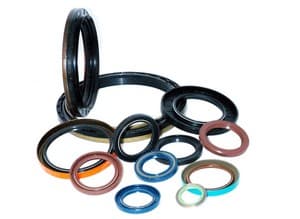Oil Seal Compounds

There are many materials of oil seals. All of which vary in resilience to specific conditions. The most commonly used materials in oil seals are Buna (Nitrile) and Viton®.
Buna (Nitrile) oil seals are the most widely used elastomer in sealing. Nitrile oil seals have great resistance to petroleum oils and fuels, mineral oils and greases, hydraulic fluids, water, steam, and alcohol. Nitrile has a great set of attributes such as low compression set, high tensile strength, and abrasion resistance.
Viton® oil seals have a high temperature and chemical resistance to petroleum oils and fuels, mineral oils and greases, solvents, hydraulic fluids, water, and steam. They have low compression set characteristics. Viton® oil seals are used preferably in chemical exposure situations and for hard vacuum service.
Silicone oil seals have a high lubricant absorbency which minimizes friction and wear. Silicone oil seals are resistant to mineral and vegetable oils, salty solutions, and various environmental conditions. Silicone is typically used in the food and beverage and medical/pharmaceutical industries.
EPDM oil seals are suitable for use with alcohol, water, greases, and other environmental conditions. EPDM oil seals are resistant to organic and inorganic acids, sodium and potassium alkalis water, steam, and cleaning agents.
HNBR oil seals have excellent resistance to petroleum oils and sour gas. Compared to standard nitrile, HNBR oil seals have a better temperature range and higher abrasion resistance when exposed to chemicals.
Teflon® oil seals are tough, chemically inert, and have outstanding chemical resistance. Teflon® oil seals can be used in petroleum oils and fuels, solvents, and environmental conditions. Teflon® oil seals are for static and slow intermittent dynamic situations.
Polyacrylate oil seals have higher heat resistance than nitrile. Polyacrylate oil seals resist petroleum oils and fuels, transmission fluid, and perform well in environmental conditions. Polyacrylate oil seals are preferred in high surface speed applications.
Oil Seal Compound Chemical Compatibility
The elastomer’s resistance to temperature, abrasion, chemicals, weather, sunlight, and ozone can affect a profile’s longevity and performance. The two most prevalent materials are Nitrile and Viton. Listed below with their respective chemical compatibilities are Nitrile, Viton®, Silicone, and Polyacrylate oil seal materials.
| Fluid Media | Nitrile | Viton | Silicone | Polyacrylate |
|---|

 English
English  Español
Español  Français
Français  Português
Português  Deutsch
Deutsch  Italiano
Italiano  Русский
Русский  中文
中文  日本語
日本語  العربية
العربية  हिन्दी
हिन्दी